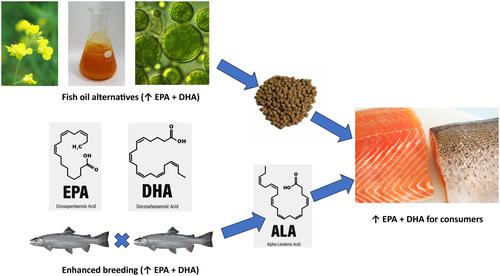当前位置:
X-MOL 学术
›
Rev. Aquacult.
›
论文详情
Our official English website, www.x-mol.net, welcomes your feedback! (Note: you will need to create a separate account there.)
Omega-3 long-chain polyunsaturated fatty acids in Atlantic salmon: Functions, requirements, sources, de novo biosynthesis and selective breeding strategies
Reviews in Aquaculture ( IF 10.4 ) Pub Date : 2023-11-27 , DOI: 10.1111/raq.12882 Zeyu Zhang 1 , Younes Miar 1 , David Huyben 2 , Stefanie M. Colombo 1
Reviews in Aquaculture ( IF 10.4 ) Pub Date : 2023-11-27 , DOI: 10.1111/raq.12882 Zeyu Zhang 1 , Younes Miar 1 , David Huyben 2 , Stefanie M. Colombo 1
Affiliation

|
The aquaculture industry is a substantial user of wild-sourced fish oil to supply omega-3 (n-3) long-chain polyunsaturated fatty acids (LC-PUFAs) in fish diets, which are required by many economically important farmed fish species, particularly Atlantic salmon (Salmo salar L.). Fish oil is commonly replaced with plant-based oils as more environmentally and economically sustainable substitutes due to concerns regarding over-fishing of wild stocks and increasing demand. One potential strategy to meet the physiological requirement for n-3 LC-PUFA is to improve n-3 LC-PUFA biosynthesis in salmon through selective breeding and strain enhancement. The objective of this review is to discuss strategies to supply sufficient levels of n-3 LC-PUFA to Atlantic salmon through the diet and de novo biosynthesis through selective breeding and salmon strain enhancement. This review provides an overview on the functions of n-3 LC-PUFA in Atlantic salmon, dietary requirements, source and supply of n-3 LC-PUFA in aquaculture feeds, and biosynthesis of n-3 LC-PUFA in fish. Several relevant studies have revealed the genetic influences on n-3 LC-PUFA biosynthesis and storage in Atlantic salmon. The results of the present review show that selective breeding of high n-3 PUFA-producing Atlantic salmon could be an effective strategy to improve the amount of EPA and DHA stored in tissues and reduce reliance on dietary sources of n-3 LC-PUFA such as fish oil.
中文翻译:

大西洋鲑鱼中的 Omega-3 长链多不饱和脂肪酸:功能、要求、来源、从头生物合成和选择性育种策略
水产养殖业是野生鱼油的大量用户,用于在鱼类饲料中提供 omega-3 (n-3) 长链多不饱和脂肪酸 (LC-PUFA),这是许多经济上重要的养殖鱼类所需要的,特别是大西洋鲑鱼(Salmo salar L.)。由于对野生种群过度捕捞和需求增加的担忧,鱼油通常被植物油取代,作为环境和经济上更可持续的替代品。满足 n-3 LC-PUFA 生理需求的一种潜在策略是通过选择性育种和品系增强来改善鲑鱼中 n-3 LC-PUFA 的生物合成。本综述的目的是讨论通过饮食和选择性育种和鲑鱼品系增强从头生物合成向大西洋鲑鱼提供足够水平的 n-3 LC-PUFA 的策略。本综述概述了 n-3 LC-PUFA 在大西洋鲑鱼中的功能、饮食要求、水产养殖饲料中 n-3 LC-PUFA 的来源和供应,以及鱼类中 n-3 LC-PUFA 的生物合成。几项相关研究揭示了遗传对大西洋鲑鱼 n-3 LC-PUFA 生物合成和储存的影响。本综述的结果表明,选择性育种高产 n-3 PUFA 的大西洋鲑鱼可能是提高组织中储存的 EPA 和 DHA 量并减少对 n-3 LC-PUFA 膳食来源的依赖的有效策略,例如如鱼油。
更新日期:2023-11-28
中文翻译:

大西洋鲑鱼中的 Omega-3 长链多不饱和脂肪酸:功能、要求、来源、从头生物合成和选择性育种策略
水产养殖业是野生鱼油的大量用户,用于在鱼类饲料中提供 omega-3 (n-3) 长链多不饱和脂肪酸 (LC-PUFA),这是许多经济上重要的养殖鱼类所需要的,特别是大西洋鲑鱼(Salmo salar L.)。由于对野生种群过度捕捞和需求增加的担忧,鱼油通常被植物油取代,作为环境和经济上更可持续的替代品。满足 n-3 LC-PUFA 生理需求的一种潜在策略是通过选择性育种和品系增强来改善鲑鱼中 n-3 LC-PUFA 的生物合成。本综述的目的是讨论通过饮食和选择性育种和鲑鱼品系增强从头生物合成向大西洋鲑鱼提供足够水平的 n-3 LC-PUFA 的策略。本综述概述了 n-3 LC-PUFA 在大西洋鲑鱼中的功能、饮食要求、水产养殖饲料中 n-3 LC-PUFA 的来源和供应,以及鱼类中 n-3 LC-PUFA 的生物合成。几项相关研究揭示了遗传对大西洋鲑鱼 n-3 LC-PUFA 生物合成和储存的影响。本综述的结果表明,选择性育种高产 n-3 PUFA 的大西洋鲑鱼可能是提高组织中储存的 EPA 和 DHA 量并减少对 n-3 LC-PUFA 膳食来源的依赖的有效策略,例如如鱼油。



























 京公网安备 11010802027423号
京公网安备 11010802027423号